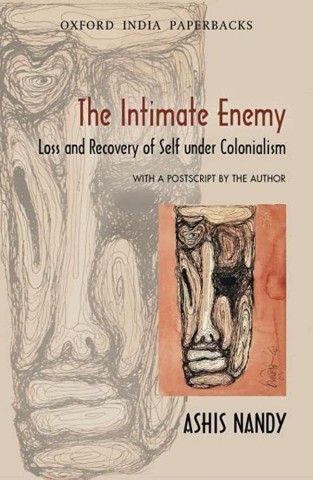Ashis Nandy's "The Intimate Enemy: Loss and Recovery of Self Under Colonialism" (1983) is a classic postcolonial text from the Asian experience. One note I found fascinating was that this author found inspiration in the writings of African revolutionaries, finding little from what he was reading from the region he lived within. Through this we see unexpected transportations of ideas. I am often asked by students about the impact of writing critical, theoretical, or philosophical works and these are reminders that while the impact of some works are immediate (and often limited to that immediate time and geography) others take time to permeate and sink in, with Nandy citing the works of Fanon and Cabral as inspirations, who wrote decades before the writing of this book. Some notes (from the 2021 Oxford reprint):
"Modern colonialism won its great victories not so much through its military and technological prowess as through its ability to create secular hierarchies incompatible with the traditional order. These hierarchies opened up new vistas for many, particularly for those exploited or cornered within the traditional order." (p. ix)
"It is now time to turn to the second form of colonization, the one which at least six generations of the Third World have learnt to view as a prerequisite for their liberation. This colonialism colonizes minds in addition to bodies and it releases forces within the colonized societies to alter their cultural priorities once for all. In the process, it helps generalize the concept of the modern West from a geographical and temporal entity to a psychological category. The West is now every where, within the West and outside; in structures and in minds. (p. xi)
"... in the eyes of the European civilization the colonizers were not a group of self-seeking, rapacious, ethnocentric vandals and self-chosen carriers of a cultural pathology, but ill-intentioned, flawed instruments of history, who unconsciously worked for the upliftment of the underprivileged of the world." (p. 14)
"I started with the proposition that colonialism is first of all a matter of consciousness and needs to be defeated ultimately in the minds of men." (p. 63)
"The word 'Hindu', T. N. Madan has again recently reminded us, was first used by the Muslims to describe all Indians who were not converted to Islam. Only in recent times have the Hindus begun to describe themselves as Hindus." (p. 103)
From the Postscript, written 25 years after its first publication:
"Do not trust authors when they talk about their books. They invariably impose a neater, intellectually more pleasing frame on their works retrospectively. I have had twenty-five years to do so in this instance. Do not also forget that a book partly writes itself and the author emerges from that experience changed - sometimes shaken." (p. 114)
"Fortunately I ran into six sensitive, brilliant intellectuals, all of whom had an African connection. While Franz Fanon and Octave Mannoni were psychiatrists, the other four - Aime Cesaire, Albert Memmi, Amilcar Cabral and Leopold Senghor - were writers and thinkers. Except probably for Fanon, who came to a small section of Indians via Jean-Paul Sartre, none of the rest were taken seriously by the aggressively English-positivist culture of the Indian academe. But they were like a breath of fresh air to me." (p. 116)
"Conformity need not be monitored, dissent has to be. In any hegemony, dissent defines the limits and the final shape of legitimacy of a system, not conformity. The colonial culture redesigns the entire educational system and the process of socialization to ensure the spread of definitions of sanity, rationality, adulthood and health that automatically stigmatize all unruly dissent as childish, irrational and retrogressive." (p. 118)
"The good English, we know from Oscar Wilde, went to Paris when they died. Well-educated, modern Indians and Chinese, if they have been good, expect to go to London or New York when they die. Colonialism has equipped them with not only a new vision of a good society, but also the wherewithal to enter the rat race of progress." (p. 119)
"The Atlantic slave trade and modern colonialism were two early attempts to globalize. The former touched four continents, the other five. If colonialism was an attempt to infantilize peoples and cultures, the slave trade was an attempt to commodify human beings themselves. The ornate prose that justified the trade, like the prose that justified child labour in Victorian England, saw in slavery redemptive features that we now consider obscene. Both abridged the meaning of the universal by claiming to be based on universal values and secular trends in history, politics and society. The demise of slavery and colonialism has given globalization, vending its own brand of universalism, a new reach and legitimacy. The battle against globalization could have been a battle to recover the universal from the clutches of the global. It has failed to beo so because the resistance to globalization has mostly remained captive to the colonial definition of the universal." (p. 123)

